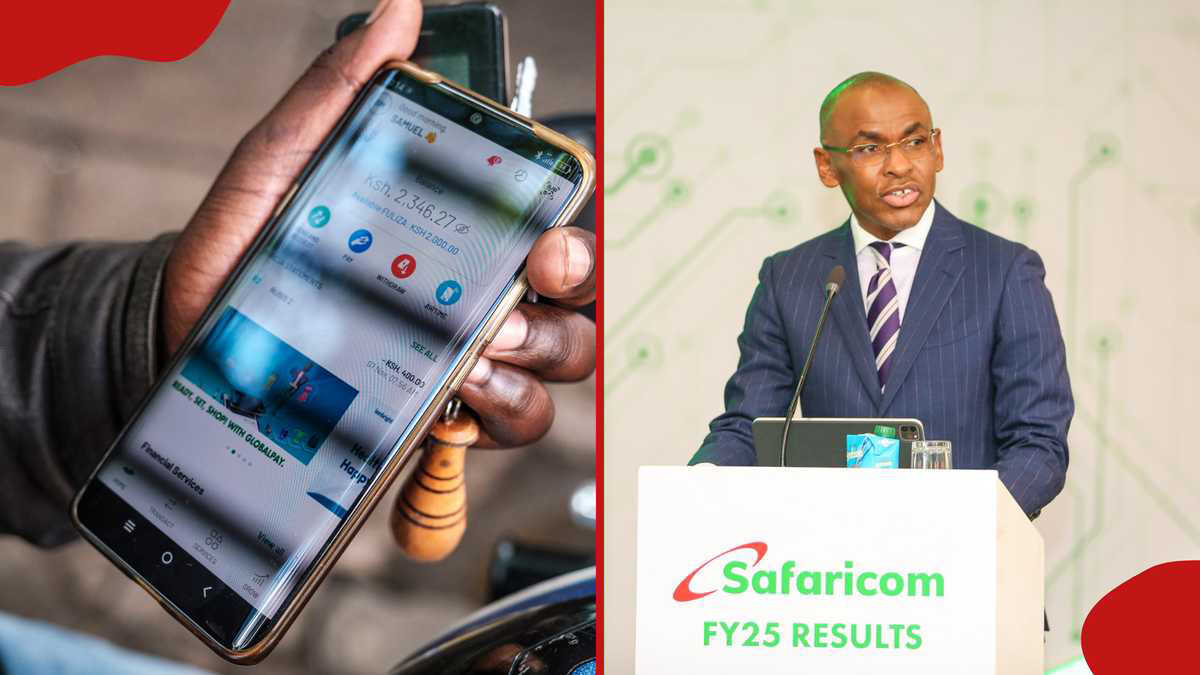
Side by side photo of Safaricom's Mshwari and CEO Peter Ndengwa. Photo/Courtesy
By Daisy Okiring
Safaricom PLC has confirmed that its M-Shwari mobile banking service experienced a major outage on Wednesday evening, sparking panic among thousands of customers who were unable to access their funds.
The disruption, which lasted for several hours, saw Kenyans flood social media platforms with complaints, some claiming their savings had “disappeared” and others fearing they would go hungry without access to their money.
Safaricom Responds
In a statement posted in response to user comments on Facebook, Safaricom apologised for the technical hitch and assured customers that its team was working to restore services.
“Sorry, we are experiencing an outage on M-Shwari services. We are currently working on a resolution. Apologies for the inconvenience,” the telco wrote.
By late Wednesday night, some services had been partially restored, though reports of failed withdrawals continued to trend online.
Read More: Cash crunch looms as 26 counties’ budgets rejected
Customer Frustration Boils Over
The outage triggered widespread anxiety, with many Kenyans taking to social media to vent their frustration.
- Kirui Voke lamented: “M-Shwari has eaten my money.”
- Nick Nicko Mwendwa complained: “M-Shwari ikona nini? Tried several times kutoa my few coins in vain… na sweat hapa tu. Kwani mnaturamba?”
- Bills Rules quipped: “Shida ni gani na M-Shwari… ama leo mnataka nilale njaa?”
- Lavisa Derrick Lade added: “M-Shwari is not functioning. Please help.”
- Molly Atieno claimed: “I managed to withdraw some cash, but the balance after the transaction does not add up.”
Others expressed desperation, saying they had been left stranded without food or transport fare. Kilonzo Oscar wrote: “Leo nimelala njaa wakuu na niko na pesa kwa M-Shwari.”
Broader Concerns Over Trust
The outage rekindled long-standing concerns about the reliability of mobile money-linked savings and loan products. For many Kenyans, M-Shwari is not just a convenience but their main banking platform — used for savings, emergency loans, and day-to-day expenses.
With over 40 million M-Pesa users, any glitch affecting M-Shwari services can disrupt households and small businesses nationwide. Analysts say the Wednesday disruption underscores the need for redundancy systems to ensure such outages are minimised.
Loan Services and Eligibility Questions
Amid the outage, questions resurfaced about who qualifies for M-Shwari loans. Some customers complained that despite being long-time M-Pesa users, they were still unable to access credit.
Safaricom explained that eligibility depends on multiple factors, not simply how long a customer has held a line. These include:
- Savings and transaction history on M-Shwari.
- Outstanding loans tied to the customer’s ID number.
- Timely repayment of other digital loans, including Fuliza, Hustler Fund, and KCB M-Pesa.
- Mobile service behaviour such as Okoa Jahazi repayment.
- Credit Reference Bureau (CRB) rating.
The company noted that M-Shwari loan limits are automatically reviewed by its system based on these factors. “Having an M-Pesa line for 10 years alone does not guarantee a loan,” Safaricom clarified.
Read More: Kenyans to get Sh4m rural housing loans under new regulations
Public Pressure on Safaricom
This latest outage comes at a time when Safaricom is under increased public scrutiny for the reliability of its services. With M-Shwari being a partnership between Safaricom and NCBA Bank, some Kenyans questioned whether the problem was on the telco’s side or within the banking system.
Financial analysts say such incidents highlight the risks of over-reliance on digital financial services without sufficient consumer protection mechanisms. “When people cannot access their money, even for a few hours, it directly affects food security, transport, and health emergencies,” one Nairobi-based economist noted.
The Bigger Picture
Safaricom has faced previous backlashes for outages in its mobile money services, though Wednesday’s M-Shwari disruption appears to have struck a deeper nerve, given its timing at the end of the month — when many Kenyans withdraw savings to settle bills.
The telco has since assured customers that their funds remain safe and that no money has been lost. However, for users who spent anxious hours fearing they had been “robbed digitally,” the experience may dent trust in one of Kenya’s most widely used financial tools.
Looking Forward
Safaricom has not disclosed the specific cause of the outage but said a technical investigation is underway. The firm promised updates as restoration efforts continue, urging customers to remain patient.
As digital banking grows, analysts say outages like this could push regulators to demand stricter service-level guarantees from telcos and partner banks to safeguard consumers.
For millions of Kenyans, Wednesday night’s outage was more than an inconvenience — it was a reminder of the vulnerability of digital finance in a cashless economy.



